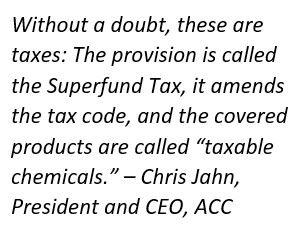Congress moved one step closer to enacting infrastructure legislation yesterday when Senate lawmakers voted to begin debate on the latest version of their bipartisan deal with the Biden Administration. While the text has not been released yet, all indications are that the plan continues to include $13 billion in new Superfund taxes on 42 chemicals, critical minerals, and metallic elements. Much of cost will be borne by American chemistry, with likely ripple effects to businesses and consumers in the form of higher costs for goods that rely on chemistry components and increased pressure on supply chains already squeezed by the effects of the pandemic. Americans at every income level will be affected.
As our press statement last evening made clear, we agree on the importance of modernizing our nation’s infrastructure, and we welcome bipartisan efforts toward getting legislation across the finish line. All along, we’ve supported the development of legislation to modernize our nation’s roads, rails, bridges, ports, and pipes. We view it as one the country’s biggest challenges and greatest opportunities, with the chemistry industry providing many of the inputs to make it happen.
We’re dismayed that Senate lawmakers and the Biden Administration think it’s a good idea to impose taxes on materials that serve as building blocks for U.S. manufacturing. We’re also disappointed – and confused – to see these reinstated Superfund taxes described as “targeted corporate user fees” and to hear lawmakers say the deal includes no taxes. Make no mistake, these are taxes: The provision is called the ‘Superfund Tax,’ it amends the tax code, and the covered products are called ‘taxable chemicals.’

While the language used by its supporters may be benign, its costs and impacts are not. We strongly oppose this misguided ‘pay-for,” which singles out an industry that has been a driver of U.S. investment and jobs over the past decade and serves as the first link in America’s manufacturing supply chain. We’ll be engaging with lawmakers and the administration to discuss ways to prevent this far-reaching action and to promote American manufacturing, as President Biden pledged in his speech yesterday, rather than imposing harmful new taxes on critical materials.